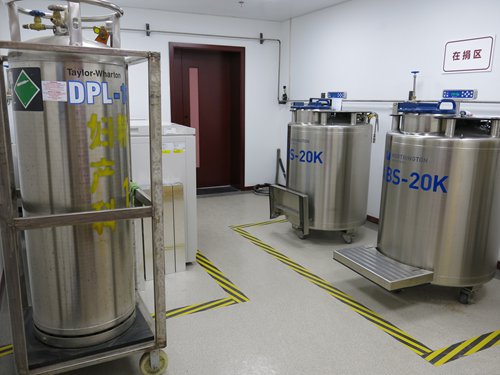
A few sperm containers placed at the Human Sperm Bank of Fudan University in East China's Shanghai Municipality. Photo: Du Qiongfang/GT
The human sperm bank in South China’s Guangdong Province held an open day recently, and introduced the use and reserves of the sperm bank to the public. One aspect quickly stood out and caught the public's attention, becoming a hot topic on Chinese social media platforms – the sperm bank is temporarily not open to unmarried women.
According to current laws and regulations in China, assisted reproductive technology is only available to legally married couples. Therefore, unmarried women cannot currently apply to use human sperm banks for pregnancy.
During the open day on Friday, Zhang Xinzong, director of the Guangdong Human Sperm Bank, said that legally married couples who have undergone checks and audits and meet the criteria for assisted reproductive technology can have their needs for frozen sperm submitted to the human sperm bank by qualified reproductive medical centers.
Amid heated public discussion of the rationale and fairness of this regulation, Zhang said on Thursday that the regulation is related to family values in Chinese society and the potential difficulties faced by single-parent families in raising children.
The original intention of setting up sperm banks in China was to help couples who are struggling with infertility, Zhang, who is also deputy director of the Guangdong Provincial Reproductive Hospital, told Southern Daily.
He also mentioned that opening sperm banks to unmarried single women and increasing the number of users may potentially increase the risks of consanguineous marriage and lead to some social issues.
Regarding the potential risk of consanguineous marriage caused by sperm banks, which is also one of the key concerns of the public, Zhang noted that the probability of consanguineous marriage occurring is almost zero with the current arrangement.
"Firstly, one can only donate sperm at one sperm bank in China, and the semen can impregnate no more than five women," he explained to the media. "Additionally, the semen from human sperm banks is not directly available to infertile couples, but is supplied to qualified reproductive centers in hospitals."
In addition, the information of volunteers is permanently stored in the human sperm bank, which will cooperate with various reproductive centers to provide free marriage counseling for offspring. With the advancement of genetic testing technology, prospective partners can undergo genetic testing at reputable medical institutions before marriage to avoid consanguineous marriage, he said.
The Guangdong Human Sperm Bank, affiliated with Guangdong Reproductive Hospital, was established in 2003. It is the only human sperm bank in Guangdong Province and the third in the country.
By the end of 2023, the frozen semen samples from the Guangdong Human Sperm Bank had been used in 54 reproductive medical centers nationwide, 27 within the province and 27 outside. Nearly 130,000 qualified frozen semen samples have been provided, benefiting over 12,000 families and resulting in the birth of nearly 15,000 children.
The Guangdong Human Sperm Bank has received over 30,000 sperm donation volunteers, with over 200,000 semen samples stored and a current inventory of over 100,000 samples.
Currently, sperm donation volunteers must undergo strict health checks and screening before donating sperm. They must be Chinese citizens aged 20 to 45, with a height of over 168cm, a bachelor's degree or above, and free from sexually transmitted diseases. They must also have no history of genetic diseases or family history of genetic diseases, such as high myopia, color blindness, or color weakness. Additionally, individuals with large tattoos are not eligible to donate sperm.
Since the population of the Chinese mainland recorded negative growth for first time in 61 years in 2022, decreasing by 850,000, the country has stepped up efforts to encourage fertility and create a family-friendly society. A number of Chinese cities recently ramped up their efforts regarding reimbursement of medical bills for fertility services to relieve childbearing parents' financial pressure, with in-vitro fertilization (IVF) also being covered in some cities' basic medical insurance system. Other areas have created various policies to encourage childbirth.
Global Times




